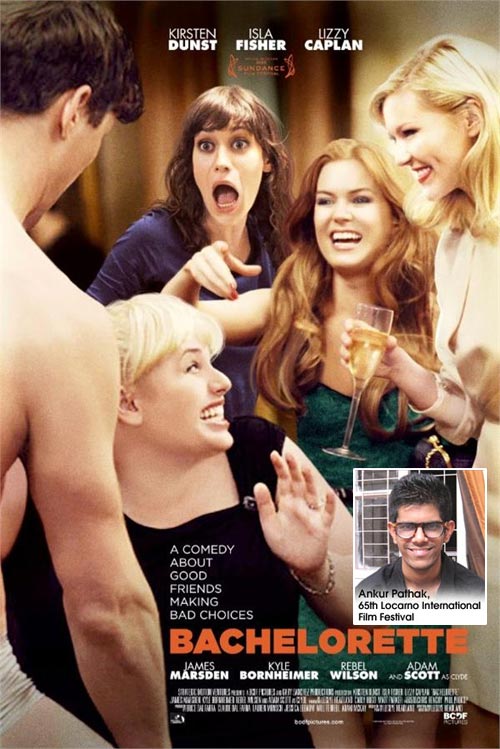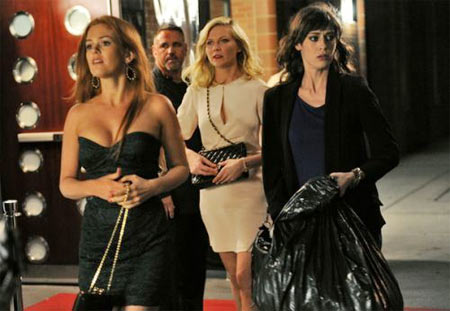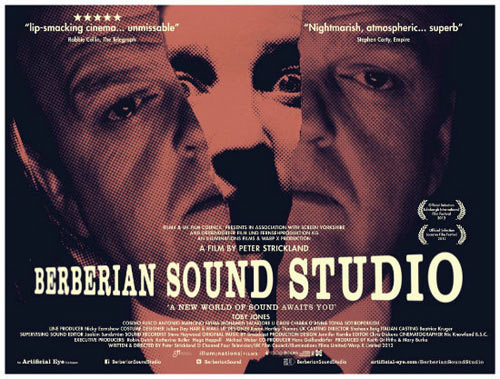This article was first published 13 years ago
Home »
Movies » Weekend Roundup: Dark films dominate Locarno
Weekend Roundup: Dark films dominate Locarno
Last updated on: August 7, 2012 16:47 IST
Image: Bachelorette poster
Most of the films shown over the weekend at the Locarno film festival had dark themes. So it was refreshing to watch Leslye Headland`s Bachelorette featuring Kirsten Dunst, Lizzy Kaplan and Isla Fisher, on Sunday evening.
The film plays out like a mirror image of The Hangover, the ladies taking on the duties of substance abuse, yelling out loud expletives, and sleeping with probable boyfriends and ex-boyfriends.
The plot is Hangover meets Bridesmaids, wherein the girl who everybody called Pig Face in high school is the first to get married to a wealthy New Yorker.
Image: A scene from Bachelorette
Her best friends, particularly Reagan (Kirsten Dunst) try to mask feelings of jealousy, insecurity, and at points, pretentiousness, to make for a rollicking maid of honour and plan the perfect bachelorette bash.
If it weren`t for its unapologetic absurdity, Headland's debut would have fallen apart, much like the wedding dress in the movie.
With characters full of contradictions, like trying to be sexual but not slutty, being the Miss Goody Two Shoes but not really being happy about it, the film is an exploration of the conflicted, insecure mind space of young American women, their aspirations, as well as the exaggerated drama stemming out of their friendships.
It's a comparatively refreshing breather in the otherwise grim selections.
Among the darker films was the deeply disturbing Berberian Sound Studio, featuring Toby Jones who plays a naive sound engineer called Gilderoy who arrives in Italy to work on the production of a local horror film.
Image: Berberian Sound Studio poster
Actresses dub shrieking vocals, and vegetables are hacked to evoke sounds of stabbing and slashing in the recording studio, triggering a sense of paranoia in Gilderoy.
Unable to maintain his grip on reality, he is driven to controlled insanity watching the exploitative nature of the film on screen and off it as well. But it is disappointing when the director, after elevating the tension to perspiring heights, fails to sustain it, leaving too much to the viewer's imagination.
Peter Mettler's The End of Time was equally radical and sweepingly ambitious in its concept (a Tree of Life-esque narrative and visual treatment).
Fascinated by the concept of time, the director tries to tie together all aspects that create the idea of time - from metaphysical to geographical--finally driving home the point that time isn't a real thing but a mere perception.
Image: The End of Time poster
The narrative follows a string of surrealistically gorgeous visuals, aided by voice-overs that contextualise and thematically bind the photographic course.
A major last part of the film has been shot in Bodhgaya in Bihar, India. Cinematographer Camile Budin spent 10 days at the spiritual centre shooting the famed wisdom tree and interacting with the locals to get a better insight.
Another French film, the hugely depressing, Quelques heures de printemps, dwells on the relationship between a terminally ill woman and her jobless son.
He is often at loggerheads with her and at the same time is unable to express his love and concern. Ultimately, the woman decides to go for assisted suicide, a legal method of euthanasia in Switzerland.
Image: Quelques Heures De Printemps poster
The film is heartfelt, as it essentially talks about the trouble we face in expressing our emotions, especially when the inevitable is near. How does one find words to sum up the compassion felt in a lifetime?
An event other than films at Locarno was a forum that debated the significance of a film critic in the social network-driven media space of today.
It was hosted by Eric Kohn, chief film critic of Indiewire, with a panel comprising international critics from papers in Brooklyn to The Sunday Mirror in the UK.
The basic idea that came out of the forum rings true for Indian entertainment journalists and film critics. Rather than focusing on the art of evaluating a film purely on its aesthetics, the priority has shifted to being the first person to tweet the verdict without even taking the time to mull over the film.




